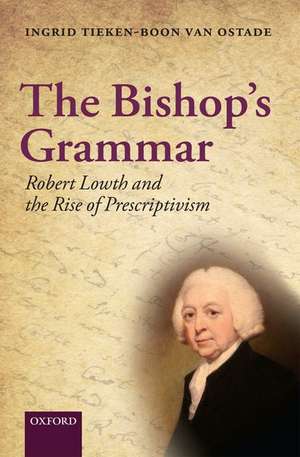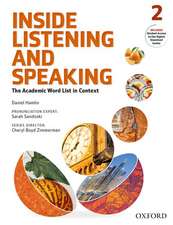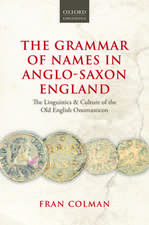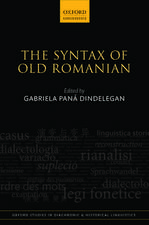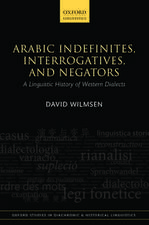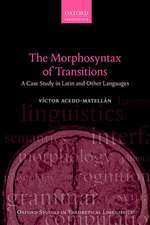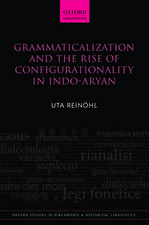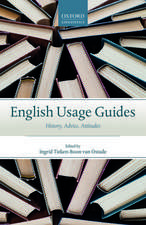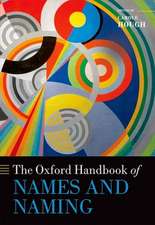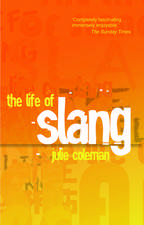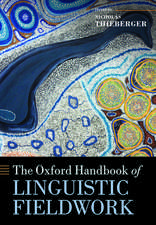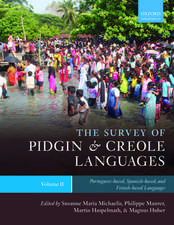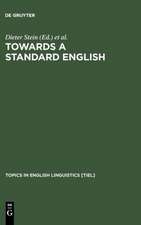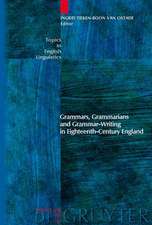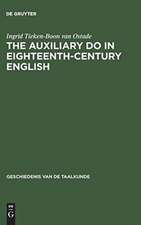The Bishop's Grammar: Robert Lowth and the Rise of Prescriptivism
Autor Ingrid Tieken-Boon van Ostadeen Limba Engleză Hardback – 25 noi 2010
Preț: 578.45 lei
Preț vechi: 1093.77 lei
-47% Nou
Puncte Express: 868
Preț estimativ în valută:
110.69€ • 118.36$ • 92.29£
110.69€ • 118.36$ • 92.29£
Carte tipărită la comandă
Livrare economică 07-14 aprilie
Livrare express 13-19 martie pentru 355.11 lei
Preluare comenzi: 021 569.72.76
Specificații
ISBN-13: 9780199579273
ISBN-10: 019957927X
Pagini: 360
Ilustrații: Figures
Dimensiuni: 162 x 241 x 35 mm
Greutate: 0.71 kg
Editura: OUP OXFORD
Colecția OUP Oxford
Locul publicării:Oxford, United Kingdom
ISBN-10: 019957927X
Pagini: 360
Ilustrații: Figures
Dimensiuni: 162 x 241 x 35 mm
Greutate: 0.71 kg
Editura: OUP OXFORD
Colecția OUP Oxford
Locul publicării:Oxford, United Kingdom
Recenzii
Tieken's great virtue is paying attention to what Lowth actually wrote, both for publication and for private circulation. rather than depending on the caricatures. She has discovered a writer on language who was uncommonly sensitive to different degrees of formality ... The Bishop's Grammar is not the last word on Lowth but, if we're lucky, it will reduce the amount of foolishness attributed to "the eighteenth-century grammarians" by those who haven't bothered to read them.
This is a key book for any scholar working on grammatical norms of the English language, and/or the codification and standardisation of English. Tieken-Boon van Ostade provides an alternative account to the standard depiction of Robert Lowth as an initiator of prespective grammar... it would be of great interest to a range of scholars, from those working on the nuances of eighteenth century grammar, to those looking at modern usage, and more broadly at the codification and standardisation of languages. Tieken-Boon van Ostade presents her argument well throughout the text, and it is clear that she is a stalwart defender of Lowth's name.
Tieken-Boon van Ostade has presented a book which is remarkable in many ways ... Apart from enriching the study of grammaticography with this methodological innovation, the author also makes a significant, well-founded contribution to debate about prescriptivism.
This is a key book for any scholar working on grammatical norms of the English language, and/or the codification and standardisation of English. Tieken-Boon van Ostade provides an alternative account to the standard depiction of Robert Lowth as an initiator of prespective grammar... it would be of great interest to a range of scholars, from those working on the nuances of eighteenth century grammar, to those looking at modern usage, and more broadly at the codification and standardisation of languages. Tieken-Boon van Ostade presents her argument well throughout the text, and it is clear that she is a stalwart defender of Lowth's name.
Tieken-Boon van Ostade has presented a book which is remarkable in many ways ... Apart from enriching the study of grammaticography with this methodological innovation, the author also makes a significant, well-founded contribution to debate about prescriptivism.
Notă biografică
Ingrid Tieken-Boon van Ostade is Professor of English Sociohistorical Linguistics at the University of Leiden. She publishes the internet journal Historical Sociolinguistics and Sociohistorical linguistics. Her books include An Introduction to Late Modern English (EUP 2009), The Two Versions of Malory's Morte Darthur (Boydell and Brewer 1995), and The Auxiliary Do in Eighteenth-Century English (Foris 1987)
